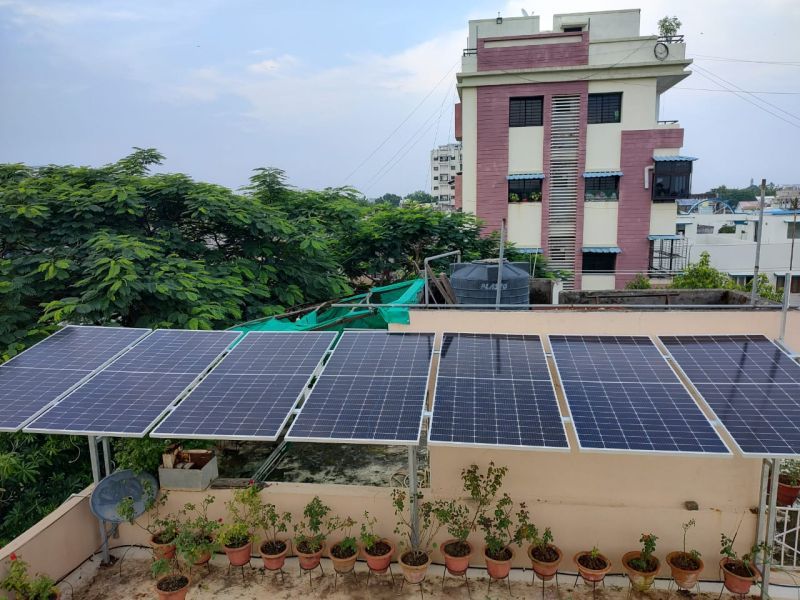India’s cumulative residential rooftop solar capacity will reach 3.2 GW by the end of the current fiscal year FY2022-23, nearly a 60% increase from 2 GW as of FY 2021-22 — according to a new report by the Institute for Energy Economics and Financial Analysis (IEEFA) and JMK Research & Analytics.
The report states the increasing need for cost savings and growing awareness among residential consumers, along with a strong push by the central government, is helping accelerate the pace of rooftop solar installations in India’s residential segment.
“India has more than 300 million households and is endowed with abundant sunshine almost throughout the year, with an annual average of 300 sunny days. This shows that the potential for rooftop solar installations in residential spaces is huge in India. We expect the growth of residential rooftop solar installations to accelerate in the near term across India because of the strong policy push and resurgent market demand,” said report’s co-author Vibhuti Garg, director – South Asia, IEEFA.
The report says Gujarat is the most favourable state for rooftop PV installations, followed by Haryana and Maharashtra. It ranked states in their attractiveness for rooftop solar based on their scores across electricity cost savings, net metering favourability, subsidy availability and disbursal, and electricity distribution company (Discom) rating.
Key drivers
The report highlights that there has been a key change brought about in consumer behaviour and demands after Covid-19.
“The lack of consumer awareness had been one of the major impediments to adoption, especially in the pre-Covid-19 era. However, post-Covid-19, there has been a strong surge in demand, backed by enhanced consciousness about cost savings, the environment, etc,” said co-author Jyoti Gulia, founder, JMK Research.
Interestingly, while the pace of the solarization of India’s residential segment has been underwhelming, the country has been the world’s least expensive residential solar power market for about a decade.
In 2020, the average cost of a residential rooftop solar system in India was $658/kW — 3.3 to 6.4 times less than in leading residential markets such as Japan, the United Kingdom, Switzerland and the USA.
The report adds that the central government’s recent push by launching a single national digital portal to simplify the process of residential rooftop solar installations and formalising a direct benefit transfer mechanism will boost capacity addition.
“The new Central Financial Assistance (CFA) scheme will allow residential consumers to buy rooftop solar systems from any registered supplier of their choice. This broadens consumers’ options for quality products and services,” says co-author Prabhakar Sharma, senior research associate, JMK Research.
Hurdles
The report also finds that some policy hurdles persist at the state level. For example, state governments must resolve issues such as delays in net metering approvals and proper communication of the benefits of rooftop solar installations. Sometimes, state Discoms delay subsidy payments to the installers, disrupting the latter’s working capital flow.
“Concerning the residential solar regulations, all Discoms must grant net metering approvals to the consumers within a strict and short timeline. In the case of residential rooftop solar systems, Discoms, in general, need to be restricted to carrying out two activities: inspecting solar plants and selling the net meters,” said co-author Akhil Thayillam, senior research associate, JMK Research.
In addition, the residential rooftop solar segment currently faces the challenges of increasing overall system costs and weak financing support.
Author: Uma Gupta
This content is protected by copyright and may not be reused. If you want to cooperate with us and would like to reuse some of our content, please contact: editors@pv-magazine.com.








3 comments
By submitting this form you agree to pv magazine using your data for the purposes of publishing your comment.
Your personal data will only be disclosed or otherwise transmitted to third parties for the purposes of spam filtering or if this is necessary for technical maintenance of the website. Any other transfer to third parties will not take place unless this is justified on the basis of applicable data protection regulations or if pv magazine is legally obliged to do so.
You may revoke this consent at any time with effect for the future, in which case your personal data will be deleted immediately. Otherwise, your data will be deleted if pv magazine has processed your request or the purpose of data storage is fulfilled.
Further information on data privacy can be found in our Data Protection Policy.